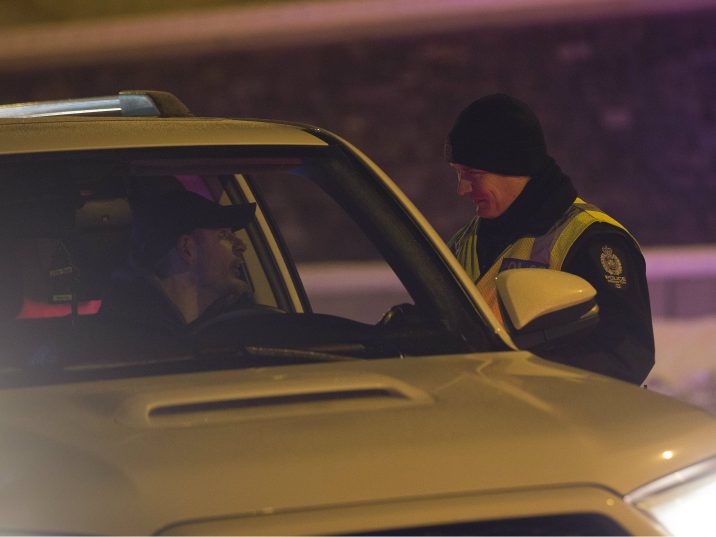Low THC levels not linked to car crashes: UBC study

University of B.C. researchers say Canada’s impaired driving laws may be too strict when it comes to low levels of THC.
The UBC study, published in the journal Addiction, found that THC levels less than five nanograms/ml of blood do not lead to an increased risk of causing car crashes in most drivers.
Canadian drug-impaired driving laws penalize drivers found to have blood THC levels of between two to five nanograms/ml with fines.
Dr. Jeffrey Brubacher, associate professor in the department of emergency medicine at UBC and lead researcher on the five-year study said in an interview Thursday that he would recommend Canada’s laws be changed to not penalize someone with under five nanograms/ml in their blood.
“I am leaning in that direction right now based on this study and the concerns we have raised about habitual users having low levels. A medical marijuana user, for example, would never be allowed to drive.”
After smoking a joint, the levels of THC go up quite high to around 100 nanograms/ml in the minutes after smoking, he said, and then they drop off very quickly.
“In four hours they’d be under two nanograms/ml,” he said.
In a person who smokes cannabis every day, THC accumulates in the body fat and gets slowly released into the blood, he added.
“These people can walk around with low amounts of THC for days or weeks after they last use, so it gets complicated…they may not be impaired.”
For the study, researchers analyzed blood samples from 3,005 drivers who were treated at seven trauma centres in B.C. between January 2010 and July 2016.
Accident reports were available for 2,318 of those drivers and 1,178 were deemed responsible for the crashes and included in the final analysis.
“We studied drivers who came in after a crash and treated for their injuries, and had blood work done. We analyzed the blood for toxicology and we measured THC levels and we measured alcohol and 87 other substances from cocaine to methamphetamines to a long list of medications.”
Then they analyzed the police reports and scored them to determine which drivers caused the crash.
“What we found is interesting, and that was at these lower levels there really was no increased risk of a crash,” he said.
He also also noted that while there may be an increased risk of causing crashes with THC levels greater than five nanograms/ml, only 20 of the 1,825 samples they tested had THC levels greater than that amount.
“I was surprised at how few people there were with higher levels (of THC)…So I expected there would be more people, especially in Vancouver or British Columbia, driving after smoking and I expected that we would see a higher crash risk so it was a little bit of a surprise.”
Comparatively, the study found that drivers who had an alcohol blood level of above .08 were six times as likely to be in a crash.
“I think people are beginning to realize that the risk of crashing with cannabis is maybe not as high as we were concerned about,” said Brubacher.
“We have to be cautious. Obviously it’s a bad idea to drive while impaired,” he said.
Brubacher, who is also a researcher with the Vancouver Coastal Health Research Institute and an emergency physician at Vancouver General Hospital, said alcohol is still the main problem.
Drugs such as cocaine, amphetamines and heroin also significantly increased crash risk, according to the study, as did sedating medications, such as antihistamines and benzodiazepines.
The study also involved researchers from the University of Victoria, Dalhousie University, the University of Toronto and British Columbia’s Toxicology Centre.
It was funded by the Canadian Institutes of Health Research, according to a UBC news release.
420 Intel is Your Source for Marijuana News
420 Intel Canada is your leading news source for the Canadian cannabis industry. Get the latest updates on Canadian cannabis stocks and developments on how Canada continues to be a major player in the worldwide recreational and medical cannabis industry.
420 Intel Canada is the Canadian Industry news outlet that will keep you updated on how these Canadian developments in recreational and medical marijuana will impact the country and the world. Our commitment is to bring you the most important cannabis news stories from across Canada every day of the week.
Marijuana industry news is a constant endeavor with new developments each day. For marijuana news across the True North, 420 Intel Canada promises to bring you quality, Canadian, cannabis industry news.
You can get 420 Intel news delivered directly to your inbox by signing up for our daily marijuana news, ensuring you’re always kept up to date on the ever-changing cannabis industry. To stay even better informed about marijuana legalization news follow us on Twitter, Facebook and LinkedIn.




